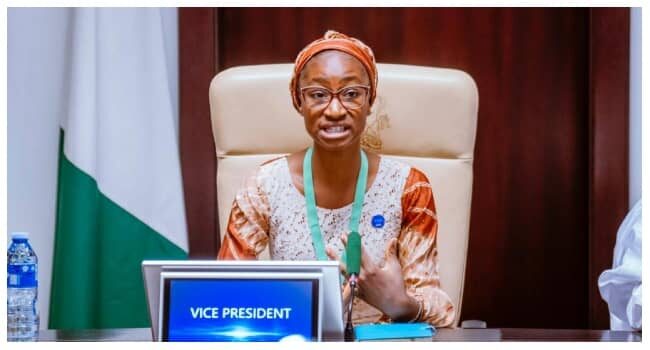In a symbolic gesture promoting mentorship and gender inclusion, Vice President Kashim Shettima, on Monday, ‘vacated’ his seat for a teenage girl, Joy Ogah, allowing her to act as Vice President of Nigeria for one day.
The inspiring event took place at the Presidential Villa, Abuja, during a courtesy visit by a delegation from PLAN International, led by its Director of Programme, Quality and Innovation, Helen Idiong.
The move, according to Shettima, reaffirmed the commitment of the Tinubu-led administration to advancing girl-child education and gender equality across Nigeria.
Addressing the delegation, Vice President Shettima emphasised President Bola Tinubu’s unwavering commitment to ensuring every Nigerian girl has access to quality education and equal opportunities.
“In President Bola Tinubu, you have an ally you can believe in and invest your trust in,” he said, stressing that the administration’s interventions including the school feeding programme remain vital to keeping children, especially girls, in school.
Shettima also hailed First Lady, Senator Oluremi Tinubu, as a shining example of the potential of an empowered girl-child.
“The First Lady is a symbol of how a properly empowered and supported girl-child can blossom into a great leader,” he said.
“I want to assure you, on behalf of President Bola Ahmed Tinubu, that this government is gender-friendly. We believe in inclusivity. We cannot disenfranchise half of our population and expect to grow as a nation.”
After his remarks, Shettima invited Joy Ogah to take over his seat, symbolically assuming the role of Vice President for a day. From the country’s second-highest office, Ogah delivered a passionate message calling for collective action to advance the rights and education of girls in Nigeria.
“We must invest in education that is safe and inclusive for every child in Nigeria. When girls are protected, peace becomes possible,” she declared.
Citing the alarming statistics that 10.5 million Nigerian children are out of school, with over 60 percent being girls, Ogah urged government agencies, development partners, and citizens to work strategically in tackling the barriers to education.
She also called for the provision of free sanitary products, improved access to water and sanitation, and nutrition support in schools, noting that these are critical to keeping girls enrolled and focused.
“I may be the Vice President for a day, but the struggles I represent cannot end in a day,” Ogah said.
“They must continue in our policies, our classrooms, our conversations, and our budgets.”
The event, described by many observers as a powerful act of mentorship and inclusion, underscores the government’s ongoing collaboration with development partners in empowering girls and young women across Nigeria.
Through initiatives like this, the Tinubu administration continues to send a strong message that gender equality is not just a policy goal but a shared national responsibility.





